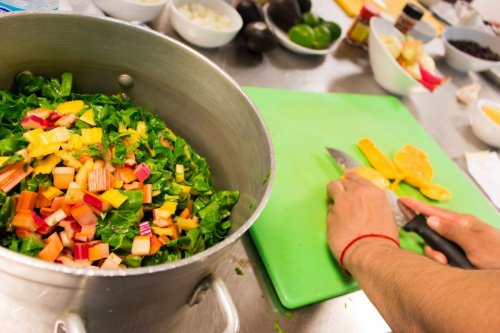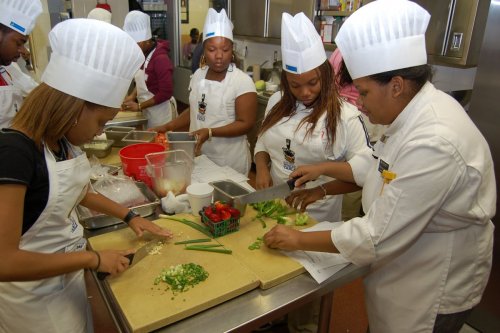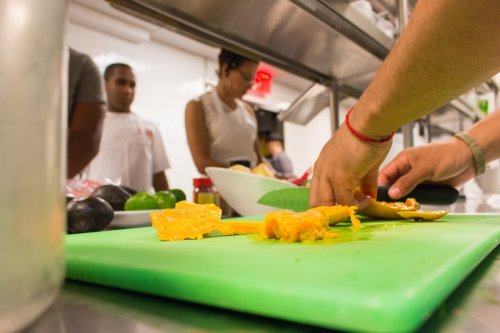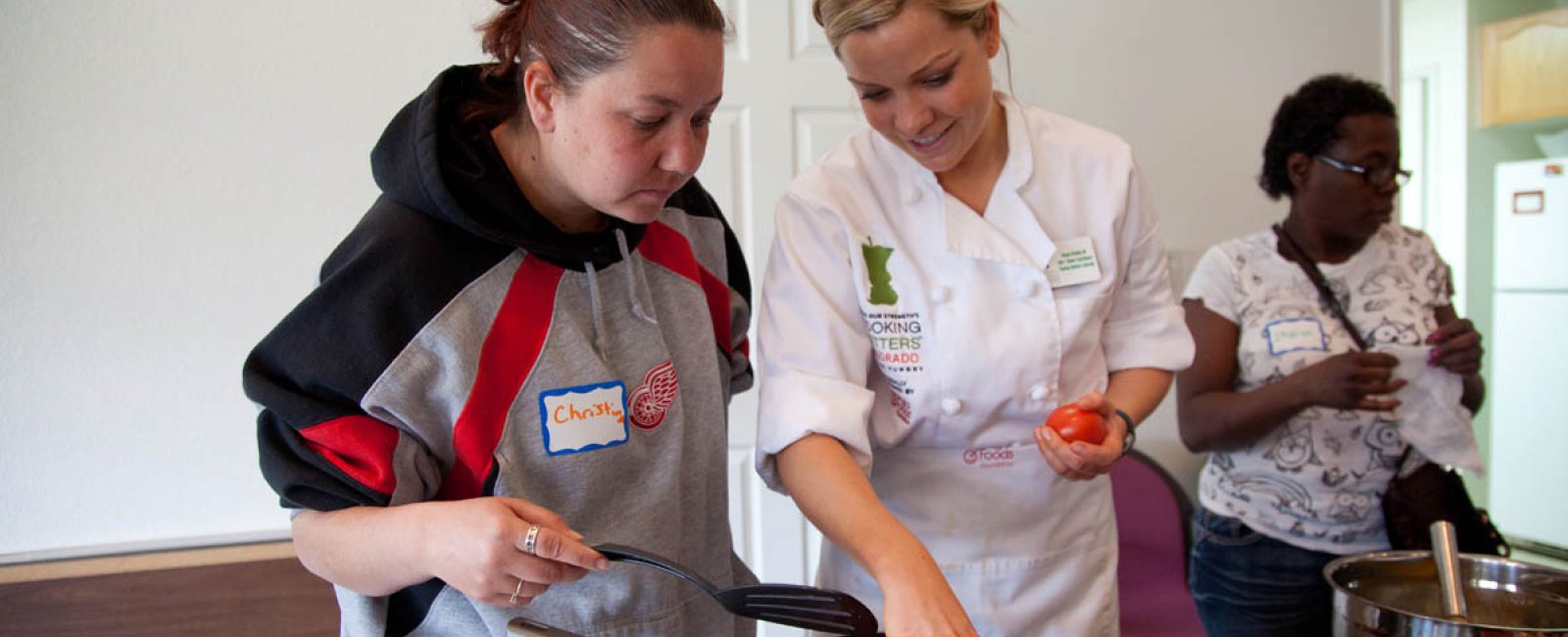Healthy eating education
Takeaways
- Healthy food access initiatives are often paired with food and nutrition education to help address barriers to healthy eating and promote sustained adoption of healthy eating behaviors.
- Healthy eating classes, workshops, and educational materials develop skills and reinforce knowledge about:
- Principles of good nutrition and healthy diets
- Shopping for healthy food on a budget
- Preparing healthy meals and strengthening cooking skills
- Tasting and becoming familiar with new healthy foods including locally produced fruits and vegetables
- Healthy eating classes and educational materials can take numerous forms. Hospitals can lead healthy eating education efforts or provide support to community-based initiatives.
Healthy food access initiatives are often paired with food and nutrition education to help address barriers to healthy eating and promote sustained adoption of healthy eating behaviors. Healthy eating classes, workshops, and educational materials develop skills and reinforce knowledge about
- Principles of good nutrition and healthy diets
- Shopping for healthy food on a budget
- Preparing healthy meals and strengthening cooking skills
- Adapting family and traditional recipes to be more healthful
- Tasting and becoming familiar with new healthy foods including locally or sustainably produced fruits and vegetables
- Recipe concepts that can be prepared with interchangeable ingredients and seasonally adjusted for variety
Healthy eating education can include nutrition classes to address specific health conditions, individual nutrition counseling, youth education, nutritional mentorships, teaching kitchens or cooking classes, supermarket or on-farm tours, and the distribution of recipe pamphlets or menu calendars. A variety of food and nutrition education formats can equip participants with the knowledge and skills to make healthy food choices a central part of their lives.
Hospital community benefit can support healthy eating education in the community in several ways. Health care professionals and hospital food service staff can directly provide the nutrition education component of healthy food access initiatives, or funds can be provided to other community partners to provide the curricula or educational materials. Health care facilities may partner with local schools of public health, medical schools, or registered dietitian programs to lead individualized or group nutrition classes to complement healthy food access initiatives in the community.
Providing nutrition information and teaching skills in cooking alone will not guarantee behavior change. Healthy eating education is more effective when combined with other efforts to address some of the many barriers to healthy eating — including making access to healthy and culturally appropriate foods both economically accessible and convenient.
This brief provides examples of several types of healthy eating classes and educational materials that can complement healthy food access initiatives.
Supplemental Nutrition Assistance Program Education
All U.S. states provide nutrition education programming for Supplemental Nutrition Assistance Program(SNAP) and other eligible households. Working through partnerships with community organizations, SNAP-Ed teaches low-income individuals and families about good nutrition and how to make their food dollars stretch further. The program offers resources on effective nutrition education interventions, provides examples of exemplary initiatives, identifies funding opportunities, and provides guidance on program evaluation. The guidance manuals for SNAP-Ed, issued by the Department of Agriculture, have highlighted various nutrition education programs as being a strong opportunity for investment and support by hospitals seeking to promote healthy eating practices among residents of areas they serve.

Nutrition education to promote diets that are healthier for people and for the planet
Health Care Without Harm’s Environmental Nutrition white paper provides a foundation for thinking more holistically about nutrition and nutrition education. Hospital community benefit staff and community partners involved in healthy food access programs are encouraged to consider how nutrition education and healthy food access initiatives can work together to promote a healthy and sustainable food system.
Nutrition and healthy eating classes using a group cohort model
The group or “cohort” nutrition education model allows program staff to reach a larger group. From the participant’s perspective, it allows the group to discuss and bond over their shared experience and build a sense of community and comradery. Group classes typically begin with instruction by a nutrition educator and move into a group discussion. Curricula vary to meet program and community needs.
Veggie Rx
Veggie Rx / Fresh Approach
California
Veggie Rx is a group nutrition education program featuring eight classes over a 16-week period.
Educational content and classroom activities include health monitoring, cooking demonstrations, and other hands-on activities. Fruit and vegetable prescription coupons are distributed at each session
92% of participants reported eating more fresh fruits and 89% reported eating more vegetables than before they started the program.
99% of participants reported being comfortable or somewhat comfortable cooking with fresh produce after completing the course.
Food is Medicine
Food is Medicine / Lifespan Health and Miriam Hospital
Rhode Island
Food is Medicine is a six-week group nutrition and cooking program. Weekly recipes and nutrition topics feature plant-based diets and olive oil-based cooking methods.
The Miriam Hospital and the Rhode Island Community Food Bank partnered to deliver the program to clients and found that participants used recipes for 2.8 meals a week, leading to a decrease in food insecurity, total food expenditures, and body mass index.
Food is Medicine Program
Lifespan Health and Miriam Hospital’s (Providence, R.I.) Food is Medicine program focuses on the health benefits of a plant-based diet. Mary Flynn, a research dietitian, developed the curriculum and associated dietary recommendations in response to rising concerns with weight gain, diet-related health conditions, and chronic disease. The recipes demonstrated during the program are designed to be simple, quick, and cost-effective to meet the needs of food-insecure and low-income populations.
Flynn also worked with McAuley Ministries’ Healing Food Project, which serves 300 hot lunches daily to individuals and families in need, to adopt the heart-healthy cooking methods and plant-based recipes. Eighty-eight percent of participants reported that they preferred the new meals as much, or more than, the original meals. From this work, the Healing Foods Project website was developed to support healthy eating at congregational meal sites. The website offers recipes and other resources.
Youth nutrition education models
Studies show that food preferences and dietary habits are formed early in life. Food and nutrition education models developed for young participants help to establish healthy habits that are likely to carry over into adulthood. Youth education can include curricula that are easily incorporated in the classroom, school garden projects, farm-to-school programs, and cooking classes or competitions. Another important aspect of youth nutrition programs is that children and youth get to try a variety of new foods at no cost to their parents. Low-income families are sometimes reluctant to purchase new or different fruits and vegetables because they may end up being wasted if their kids don’t like them. Kids having an opportunity to try and become familiar with new, healthy foods is valuable to families on a tight budget.

Teen Battle Chef
Teen Battle Chef / Family Cook Productions
Multiple states
Teen Battle Chef is a nutrition education program that develops culinary skills in youth, empowering them to become nutrition and culinary leaders in their schools and amongst their peers. Each week participants create and share recipes as part of a friendly competition. The program has been disseminated to over 150 schools and community sites across 22 states.
An alumni study was conducted from July 2016 to July 2017 to determine if there was a sustained impact of nutrition education.
Of the 30 alumni that participated in the study, 74% sustained a healthy weight up to seven years post program and 77% followed four of the six Dietary Guidelines food behavior targets. 90% of alumni positively impacted the eating behavior of family members and/or friends.
Food Supplement Nutrition Education Program
Food Supplement Nutrition Education Program (FSNE) / Maryland SNAP ED
Maryland
FSNE reaches students via nutrition education in both the classroom and in school gardens and through printed educational materials, text messaging, and the Smarter Lunchroom program. They implement a variety of programs and curricula including ReFresh, Teen Cuisine, and Market to Mealtime Kids.
26,398 participants (22,117 youth and 2,952 adults) received direct nutrition education in 2016 via Maryland SNAP-Ed programming.
In 2016, 78% of youth participants felt confident in their ability to prepare their favorite fruit or vegetable post-program.
Dig In!
Dig In! / USDA Food and Nutrition Service (FNS)
National
Dig In! is a standards-based nutrition education program that can be easily incorporated into the classroom and in school gardens. The curriculum is designed for 5th and 6th graders and is available to schools participating in USDA’s Child Nutrition programs.
The Dig In! curriculum includes 10 lessons that cover topics ranging from growing to harvesting to eating new fruits and vegetables. Schools participating in one of the USDA’s Child Nutrition programs are eligible to receive free print copies of the curriculum, at home parent handouts, and posters.
The Edible Schoolyard Project
The Edible Schoolyard Project
National and international
The Edible Schoolyard Project provides garden and kitchen education curriculum for pre-kindergarten to high school students nationally and internationally. Students learn where their food comes from and how their food choices impact their health, communities, and the environment. The program can be implemented in kitchens, garden classrooms, lunchrooms, farms, indoor classrooms, community centers, and libraries.
The network also offers technical support and training, professional development opportunities, and online resources. The online resource directory is divided into several categories including lesson planning, program development, and school food reform.
Teaching kitchen or cooking classes and demos
Teaching kitchens and cooking classes equip participants in healthy food access initiatives with skills to prepare healthy meals for themselves and their families. Seasonal produce may be incorporated into these classes to encourage purchasing fresh fruits and vegetables from local producers.
Cooking Matters
Cooking Matters / Share Our Strength
National
Cooking Matters courses are offered in two-hour segments, once per week for six weeks. The program includes seven specialized curricula that cover the following topics: nutrition and healthy eating, food preparation, budgeting, and shopping. These courses may be offered by community partners or by Cooking Matters culinary and nutrition volunteers at various community-based locations.
From April 2014 to March 2015 a long-term evaluation study was conducted revealing a 10% increase in families who felt confident in their cooking ability.
Additionally, families felt 17% more confident in stretching their food dollars.
Farm Fresh & Fabulous / SNAPilicious
Farm Fresh & Fabulous / SNAPilicious Family Cook Productions
Multiple states
Farm Fresh & Fabulous and SNAPilicious are recipe demonstration programs designed to integrate into farmers market programs, CSAs, and Food Box projects as well as SNAP-Ed. Each recipe can be modified seasonally, and participants, including children, are invited to participate in the preparation. The program is available to SNAPEd and other Teaching Kitchen operators through distance learning training.
A recent pilot of SNAPilicious in public housing developments in Harlem, New York City, directed at seniors yielded 67% repeat attendance over 8 weeks, and at 80% of the classes, participants reported having prepared one or more recipes or healthy eating strategies at home.
Teaching Kitchen Collaborative
Teaching Kitchen Collaborative / The Culinary Institute of America and Harvard T.H. Change School of Public Health
National
The Teaching Kitchen Collaborative (TKC) is a member-based network of current and planned teaching kitchens. The collaborative conducts research and hosts working groups and meetings to inform best practices for program implementation and impact assessment. TKC currently offers a beginners guide for new teaching kitchens. The collaborative is developing additional resources and curricula that will be publically available on their website.
TKC’s research working group is building a database of resources and assessment tools. This group is also currently evaluating teaching kitchens’ impact on clinical, behavioral, and financial outcomes.
Making healthy choices despite limited resources
Shopping for and cooking with fresh produce can be challenging for families with limited resources. Programs can address a variety of topics including time, transportation, and budget constraints.

Cent$ible Nutrition Program
Cent$ible Nutrition Program (CNP) / University of Wyoming Extension and the Family and Consumer Sciences Department
Wyoming
CNP offers eight hands-on classes for each of their lessons series. The eight classes are chosen from a curriculum of 17 lessons and may include topics including cooking, smart shopping, meal planning, food preparation, and nutrition. The series is free for income-qualifying participants and includes resources and materials. CNP is funded by the Expanded Food and Nutrition Program and Supplemental Nutrition Assistance Program Education (SNAP-Ed).
In 2015, 83% of participants improved in one or more of the food resources management practices, which include planning meals, comparing prices, using a grocery list, running out of food less often, and making food from scratch.
Families saved an average of $534/year in 2015.
Good Food on a Tight Budget
Good Food on a Tight Budget / Environmental Working Group
National
The Environmental Working Group (EWG) created the Good Food on a Tight Budget guide to inform shoppers of the foods that are the most healthy, most economical, and least subjected to pesticides. The EWG website provides quick links to their recommended recipes, a sample shopping list, a meal planning template, a price-tracking worksheet, general tips, lists of best foods, and an overview of their methodology.
The Environmental Working Group ranked all foods by food group based upon the following criteria in their Good Food on a Tight Budget guide: price, overall nutrition content rank, total sugars, fiber, potassium, Vitamin C, and Folate to inform consumers of the most well-rounded choice in their guide. A full discussion of their methodology can be found here.
Informational materials such as recipes, tips, and calendars
There are a variety of healthy food access initiatives that can easily couple nutrition education with other program activities. Recipes, cooking and shopping tips, calendars, and other informational materials can be distributed to participants in community-supported agriculture (CSA) boxes, at farmers markets, in retail environments, and in food pantries.
Choose Health CSA
Choose Health CSA
Minnesota
Choose Health enrolls food insecure community members (Staples, Minn.) into a subsidized CSA program that provides participants with free boxes of local fruits, vegetables, and other local products. The program is paired with quick food preparation demonstrations led by Supplemental Nutrition Assistance Program Education (SNAP-Ed) educators and University of Minnesota Extension staff for participants when they are picking up their CSA boxes. The educators also make a dish using ingredients from that week’s CSA share for sampling. Informational materials and recipes are developed and distributed to participants.
The CSA program exposed participants to 43 different varieties of fruits vegetables from June through September 2014. Surveys indicated that participants improved their ability to plan and prepare nutritious meals.
Presbyterian Healthcare Services
Presbyterian Healthcare Services/ La Cosecha CSA
New Mexico
The La Cosecha Community Supported Agriculture program, which provides subsidized CSA shares to low-income community members, features a nutrition education handout in every share distributed. Topics covered in these handouts include background on the farms supplying the produce, nutrition tips, kid-friendly recipes, and produce storage tips.
For the 2017 season, 99% of survey respondents reported that they learned something in the nutrition course that would impact their future health and that they planned to attend future classes.
Kaiser Permanente
Kaiser Permanente / Farmers Market Health Education
Multiple states
Kaiser Permanente operates farmers markets on their hospital campuses in many states. Most farmers markets feature a health education table or booth staffed by registered dietitians, nutritionists or other hospital staff. Health professionals distribute educational materials and resources including pamphlets on healthy eating and diet-related health conditions. Registered dietitians may also give presentations on nutrition topics.
A patron survey circulated to participants of Kaiser Permanente farmers markets in 2010 found that 74% of respondents reported an increase in fruit and vegetable consumption.
Nutritional mentorship
Medical students or dietetic interns can serve as nutritional mentors for community members experiencing food insecurity or obesity or working to prevent or treat diet-related health conditions. Nutritional mentors often work at community sites including farmers markets, urban farms, and community gardens.
Prevention Produce
Prevention Produce / Penn State College of Medicine
Pennsylvania
Prevention Produce was developed to provide at-risk patients and community members with fruit and vegetable prescriptions. Medical students participate in this program as “nutritional navigators” and are paired with program participants to whom they provide nutritional mentoring at local farmers markets and community gardens.
Families reported that they valued onsite mentoring, and medical students felt that it provided opportunities for professional development.
Individual nutritional counseling
Individual nutritional counseling accommodates privacy concerns and reduces the risk of participant shame. Additionally, the material covered and recommendations given can be tailored to the specific needs of the individual.

Harlem Hospital Center
Harlem Hospital Center / Bronx, New York
New York
Patients enrolled in the hospital’s fruit and vegetable prescription program receive individual nutritional counseling each month from their doctor and/or nutritionist.
The program, implemented at Harlem Hospital Center and Lincoln Medical Center in New York, educated 98.7% of participating patients about the importance of fruits and vegetables at each visit in 2013.
70% of program participants reported an increase in knowledge of the importance of fruits and vegetables.
Learn more
The Department of Agriculture Supplemental Nutrition Assistance Program Education (SNAP-ED) offers an interactive library for nutrition education programs and corresponding curricula across the country.
Harvard School of Public Health and the Culinary Institute of America’s Teaching Kitchen Collaborative offers networking opportunities and resources for organizations featuring existing and future teaching kitchens.
Family Cook Productions offers teaching kitchen support and assessment services for existing and planned hospital programs.
